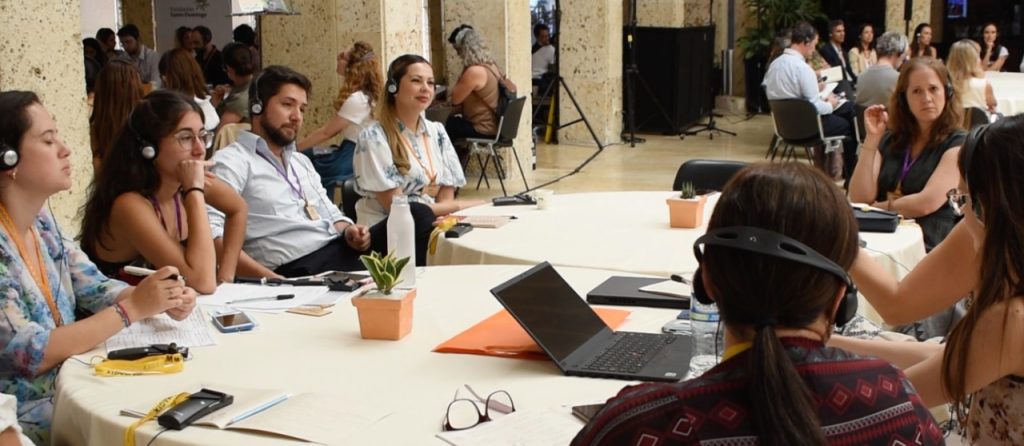Impact investing is a concept increasingly used in the world of investment, philanthropy and social action.
Increasingly, we hear that companies or organizations are committing to investments that, in addition to the financial return, generate a positive impact on the environment and people. Is there a favorable legal environment for this type of investment? Everything indicates that there are steps in the right direction and that there is still a long way to go in terms of public policies and the actions of organizations dedicated to the subject.
VIVA Idea considers impact investing to go beyond the classic definition. In the opinion of Paola Fonseca, VIVA Idea’s Impact Director, “it is more than financial profitability with social or environmental impact. It is a tool for beneficiaries to develop their own solutions for social inclusion and sustainability, according to their contexts”.
In other words, the triple positive impact (financial, social and environmental) is not enough. For Fonseca, impact investment must contain a component of empowerment of the impacted or beneficiary communities and must be sustainable over time, according to their own realities and contexts.
VIVA Idea, as chair of the Impact Investment Platform in Central America (PiiC), is mapping public policies in the region related to impact investment. In Colombia, Peru, and Panama, for example, there are the Benefit and Collective Interest Companies (BIC), which are the legal figures that companies that have impact as their objective can resort to.
In Peru, the definition of “collective benefit and interest” is “the positive material impact or the reduction of a negative impact on society and the environment”.
In Colombia, according to legislation, the corporate purpose of a company must include, in addition to the acts of commerce that it intends to develop, those activities of collective benefit and interest that it intends to carry out in each of the five dimensions: business model, corporate governance, labor practices, environmental practices and community practices.
One of the problems that have been noted in the region is the lack of interest in legal processes. Businessmen or entrepreneurs do not usually put it at the top of their priorities.
A movement of lawyers involved in impact investing seeks to redefine the legal framework and legal practice by designing new corporate and financial structures, drafting new laws and presenting seminal cases. It is the Global Alliance of Impact Lawyers (GAIL), a community of legal leaders using the practice of law to make a positive impact on people and planet, and to accelerate just transition.
For GAIL, “lawyers are in a unique position to facilitate change and support the movement toward a more equitable system.”
Paola Fonseca is a lawyer and member of GAIL. “What we are looking for is to look at the challenges, to see how the regulatory framework and the work of lawyers in each country can work, this is one of the challenges of the community of lawyers in the impact investment ecosystem”.
For Fonseca, everything is based on knowledge and sharing that knowledge, creating knowledge from the context of the work of the impact investment ecosystem is part of the added value that specialized lawyers have.
GAIL is leveraging the expertise of lawyers to “accelerate change in corporate models and capital to ensure that businesses are truly a sustainable force for good, while learning from across the spectrum of impact disciplines.”
For Fonseca the key word is context. He sees the need for regulation as framing the playing field for all players equally, but according to the context in which they are working. This context will also show the needs that companies and organizations have and that lawyers working in impact investment will be able to solve according to the knowledge acquired and according to the progress of legislation and instruments.
“How do we get the State to move in the right direction? By giving it the context so that when the necessary decisions are made, they are the best ones that the ecosystem needs to be more effective and make impact investment possible to improve the conditions of entire populations in each of the countries,” said Fonseca.

The regional policy diagnostic review initiative being carried out by the iiCP seeks to map public policies aimed at promoting impact investment in the Central American region (including Panama). It seeks to identify the regulatory and public policy landscape in the region and identify its main strengths and challenges in terms of promoting or discouraging impact investment. In this way, it seeks to provide public and private sector actors with a tool to facilitate the implementation of relevant measures to strengthen impact investment in the region.
In Central America, the regulations have not achieved the development of the impact investment ecosystem, nor have they explicitly incorporated it at the legal level. Therefore, the report analyzes investment and entrepreneurship regulations that could be indirectly promoting or discouraging the impact investment ecosystem.
The information identified will also be analyzed by expert lawyers across the region who have corroborated from a practical perspective the real impact of these regulatory bodies in the local context.
Impact investment needs to make progress in the possibilities offered by each country’s regulations in order to take another step forward in the consolidation of the impact investment ecosystem in the region, which has no turning back.
As Sir Ronald Coen, chairman of the Global Steering Group for Impact Investment (GSG), put it, in a few years’ time “all companies will have to incorporate impact into their business model to ensure success and survival. This is what consumers, investors and employees are demanding. Impacts will be spread around the world”.
Central America must prepare to take advantage of the environmental and human benefits of this process.